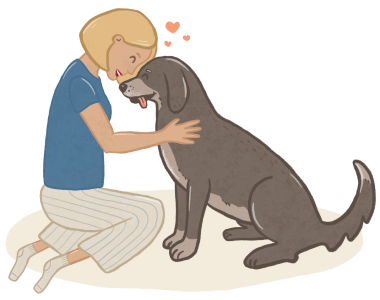How do I support my dog with cancer?


Finding out that your dog has cancer can bring about a mix of emotions, it is incredibly heartbreaking and overwhelming to try and find the best treatment and information to help your pet. It is important to stay positive during this time and know that canine cancer treatments have come a long way. While we hope you and your pets never have to go through this, Big Dog are here to help with any questions and concerns you may have.
Supporting your dog after a cancer diagnosis will likely involve a combination of medical care and treatments, emotional support and adjustments to their lifestyle to ensure their comfort and well-being.
Here are some ways to support your dog:
1. Chat with your Vet or a Holistic Veterinarian and a Canine Nutritionist
Your trusted professional will provide you with great information on treatment options, a prognosis and palliative care. Holistic Veterinarian’s and Canine Nutritionists are a great option to discuss your dog’s treatment in conjunction with raw feeding. Veterinary oncologists can also be a great option to look into for specialised treatments.
It is important to learn about your pet’s type of cancer, as some are treatable but not curable, meaning the symptoms can still be alleviated or their lifespan potentially extended and quality of life improved(2).
2. Decide on your Treatment Options
After you’ve talked with your vet, take a chance to research the treatment options and advice they’ve given you. They will likely recommend surgery, chemotherapy, radiation therapy, or immunotherapy. To help make your decision, ask them for the benefits and risks related to each option and specifically in relation to your dog’s medical history and overall health. You may find comfort in knowing that dogs handle chemotherapy better than people.
Dr Edward Bassingthwaighte has written a great article which helps to understand the veterinary approach to a dog cancer diagnosis and treatments as well as integrative, holistic, complementary and alternative treatment options. You can check it out here: Supporting Pets with Cancer: Prevention & Treatments(3).
3. Nutrition
Dr Edward Bassingthwaighte also discusses the importance of nutrition for a dog with cancer in the above blog. His top recommendations are finding a diet that starves the cancer which means low or no carbs(3).
However, we always suggest feeding a minimally processed raw food diet over a highly processed one, as highly processed foods may cause inflammation that can negatively impact our pets’ immune function. Food processing significantly alters the form of food from its raw state and is well-known to negatively impact the nutrient content of foods. It is for these reasons we recommend a natural, bioavailable raw food diet that contains a wide array of whole foods enriched with natural vitamins, minerals, good fats, probiotics, enzymes, antioxidants and anti-inflammatory ingredients in order to support the immune system and re-nourish the body.
4. Pain Management
Cancer can cause pain and discomfort for your pet; your vet may prescribe pain medication to help with this. You can also help manage your pet's pain through physical therapy such as massage, stretching exercises, or hydrotherapy to alleviate pain and improve mobility.
If you can, provide your dog with ramps or steps to help them access elevated surfaces, as well as a cosy and safe environment where they can rest.
Explore alternative therapies such as acupuncture, chiropractic care, or herbal remedies under the guidance of a Holistic Veterinarian or a Canine Nutritionist.
Emotional support can also comfort your dog while they’re in pain, spend time with them, offer them affection and engage in activities they enjoy. When they need a break, give them space(2).
5. Monitor Symptoms and Follow-Up Care

Keep an eye on your dog’s behaviour for any changes, monitor their appetite, symptoms and responses to treatment. If you’re concerned at any point, make a follow up appointment with your vet. You can change their care plan or make any necessary adjustments to your pet's treatment plan at any time(1).
6. Quality of Life
If your dog’s behaviour changes it may be a sign that they’re no longer comfortable. You may find they’re unable to do their favourite things, moving around less or changing their behaviour, it may be an indication cancer is impacting their quality of life.
If you have a highly active or working dog, ensure they are resting and if they have limited mobility provide them with mental stimulation such as Licki Mats and slow feeders to exert energy(1).
7. Considerations for End-of-life care
If your dog’s cancer is advanced, their treatment options are limited, or their diagnosis is terminal, you can discuss end-of-life care with your vet. They will provide you with options regarding palliative care, pain management and euthanasia when the time comes. There are veterinaries who make house calls at any time to provide comfort care if needed. Providing your dog with comfort and dignity in their time of need is never easy, but something they deserve. We’re incredibly sorry if you find yourself in the position of making this decision(2).
We hope this information helps you to support your dog with cancer and makes the process easier.
